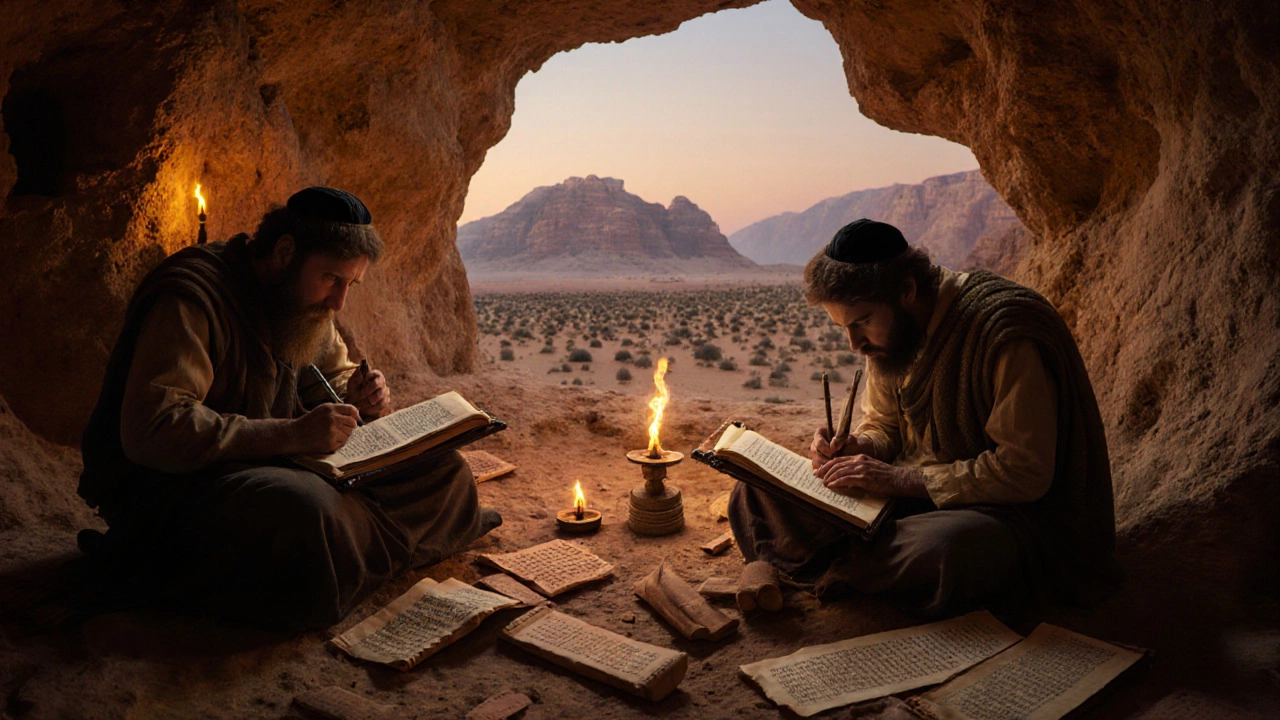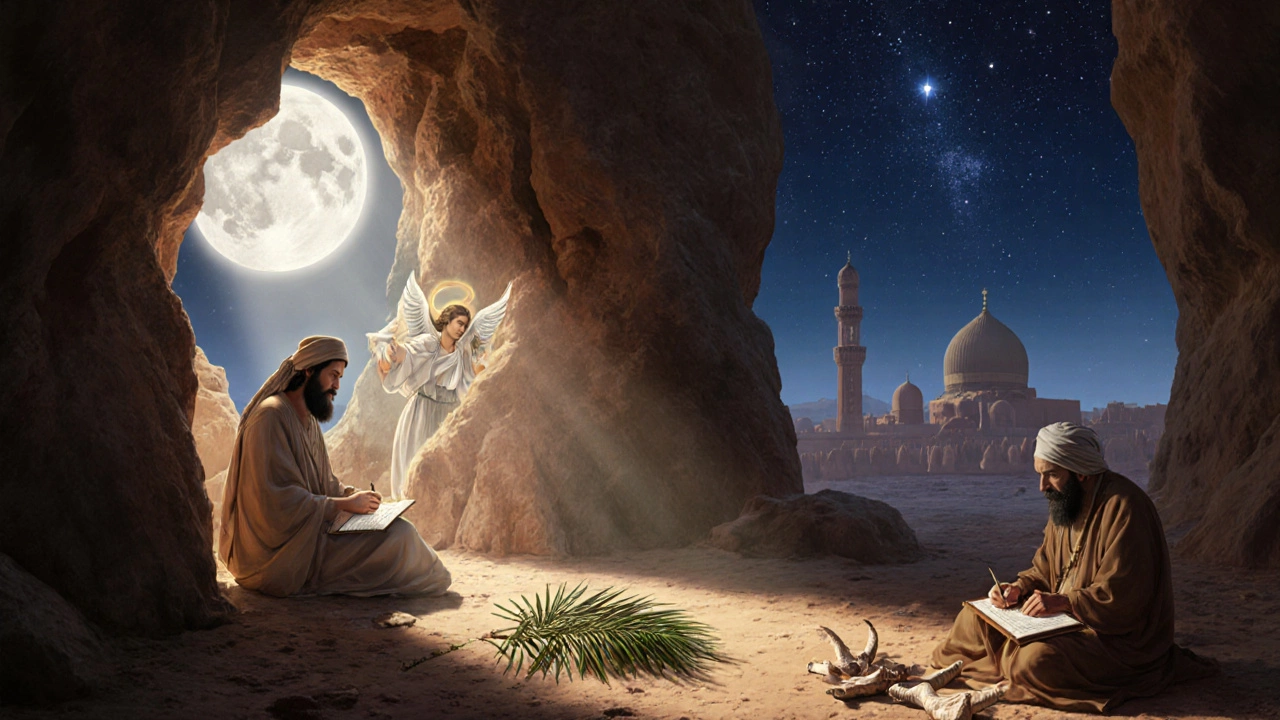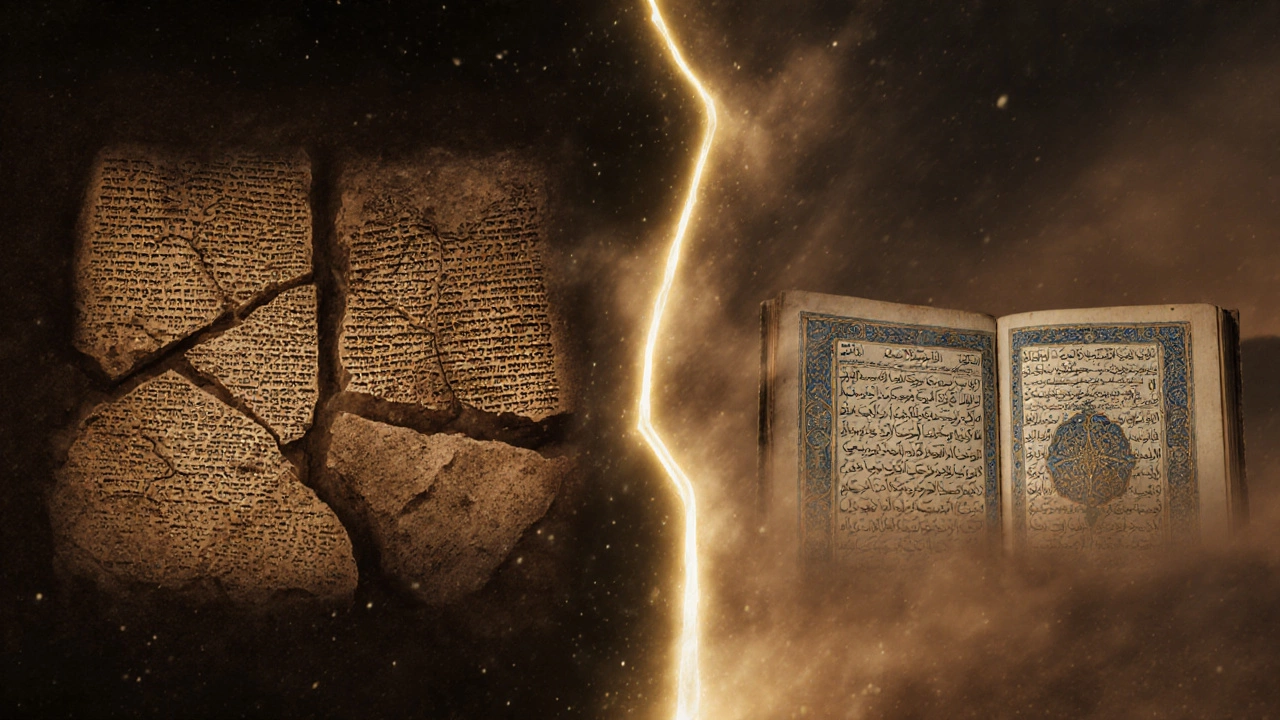
Sacred Text Timeline Calculator
Compare Sacred Text Timelines
Time Difference
People often ask which came first: the Quran or the Bible. It’s not just a trivia question-it’s about understanding how faiths grew, changed, and shaped cultures across centuries. The answer isn’t simple, because the Bible isn’t one book. It’s a collection. And the Quran? It’s a single revelation, delivered over a short time. So let’s cut through the noise and lay out the facts, plain and clear.
The Bible: A library built over 1,000 years
The Bible you hold today didn’t appear all at once. It’s the result of centuries of writing, editing, and compiling. The oldest parts are from the Hebrew Bible-the Torah, or first five books attributed to Moses. Scholars agree these were written between 1,200 and 900 BCE. That’s over 3,000 years ago. The Book of Genesis, for example, likely took shape during the Babylonian exile, when Jewish communities were trying to preserve their identity far from home.
After the Torah came the Prophets and Writings. Books like Isaiah, Psalms, and Daniel were added over the next 500 years. By 200 BCE, the Hebrew Bible was mostly complete. Then, centuries later, early Christian communities added the New Testament. The Gospels-Matthew, Mark, Luke, and John-were written between 70 and 100 CE. Paul’s letters came even earlier, around 50 CE. So the full Christian Bible, as we know it, wasn’t finished until nearly 400 years after Jesus’ death.
That means the earliest parts of the Bible are more than 2,700 years older than the Quran. Even the newest parts of the Old Testament predate the Quran by 500 years.
The Quran: A single revelation in 23 years
The Quran, by contrast, was revealed over a single lifetime. According to Islamic tradition, the angel Gabriel began delivering verses to the Prophet Muhammad in 610 CE, in a cave near Mecca. That’s 600 years after the New Testament was written. The revelations continued for 23 years, until Muhammad’s death in 632 CE. There were no gaps, no later additions. The words were memorized by followers and written on palm leaves, bones, and parchment as they came.
After Muhammad died, his companions gathered these scattered pieces into one book. The first official compilation happened under Caliph Abu Bakr, around 633 CE. Then, under Caliph Uthman, around 650 CE, a standardized version was created and sent across the growing Islamic empire. That’s the version still used today.
So the Quran, as a complete text, is just over 1,390 years old. Nothing in it predates the 7th century CE.

What about other religious texts?
It’s worth noting that the Bible isn’t the only ancient scripture. The Hindu Vedas, for example, were orally passed down for centuries before being written down around 500 BCE. The Avesta, the sacred text of Zoroastrianism, also has roots going back to 1,000 BCE or earlier. But these aren’t part of the Bible or Quran, and they’re not usually part of this comparison.
Still, the point stands: the Bible’s oldest writings are far older than the Quran. The Quran is a later text that references earlier ones. Surah 5:44 says Muslims should follow the Torah. Surah 5:46 mentions the Gospel. The Quran doesn’t claim to be the first-it positions itself as the final, corrected version.
Why does the timeline matter?
It’s not about which is "better." It’s about context. The Bible reflects the history of ancient Israel, the Roman Empire, and early Christian communities. The Quran responds to the social, religious, and political world of 7th-century Arabia-polytheism, tribal conflict, Jewish and Christian communities living side by side.
If you read the Bible, you’ll see stories of kings, prophets, and exiles. If you read the Quran, you’ll hear direct addresses to a community trying to build a new society. The tone, structure, and purpose are different because they emerged from different times and places.
Some claim the Quran copied the Bible. That’s not accurate. It references stories found in Jewish and Christian traditions-like Adam, Noah, Moses, and Jesus-but retells them with different details, emphasis, and theological meaning. These weren’t secrets. They were common knowledge in the region. The Quran assumes its audience already knew them.

What do historians say?
Scholars from all backgrounds-Muslim, Christian, Jewish, secular-agree on the basic timeline. The oldest biblical texts are from the first millennium BCE. The Quran is from the early 7th century CE. This isn’t a matter of belief. It’s documented in archaeology, linguistics, and manuscript analysis.
The Dead Sea Scrolls, found in the 1940s, include fragments of biblical books dating back to 250 BCE. They match modern versions almost exactly. That proves the Hebrew Bible was already stable over 2,200 years ago.
As for the Quran, the Sana’a manuscripts, discovered in Yemen in 1972, contain early Quranic texts from the 7th century. They’re slightly different in spelling and wording, but the core message matches today’s Quran. That confirms the text was compiled soon after Muhammad’s death.
So which is older?
The Bible’s earliest writings are older than the Quran by more than 1,700 years. Even the latest books of the Old Testament were written before the birth of Christ. The Quran came more than half a millennium after the New Testament.
It’s not a competition. But if you’re asking which came first, the answer is clear: the Bible. The Quran came later, built on the same spiritual soil, but speaking to a new time and a new people.
Understanding this doesn’t weaken either faith. It deepens it. It shows how sacred texts evolve-not by accident, but in response to history, community, and the enduring human search for meaning.
Is the Bible older than the Quran?
Yes, the Bible is significantly older. The oldest parts of the Bible, like the Torah, were written between 1,200 and 900 BCE. The Quran was revealed between 610 and 632 CE. That means the earliest biblical texts are more than 1,700 years older than the Quran.
Did the Quran copy the Bible?
No, it didn’t copy it. The Quran references stories from Jewish and Christian traditions-like Adam, Noah, Moses, and Jesus-because those were well-known in 7th-century Arabia. But it retells them with different details, structure, and theological focus. It doesn’t claim to be a rewrite. It presents itself as a confirmation and correction of earlier messages.
Are there older religious texts than the Bible?
Yes. The Hindu Vedas were passed down orally for centuries before being written around 500 BCE. The Zoroastrian Avesta also dates back to at least 1,000 BCE. But these are separate traditions. When people compare the Quran and Bible, they’re usually referring to Abrahamic faiths, where the Bible is the earliest complete scripture.
When was the Bible compiled into one book?
The Hebrew Bible was mostly complete by 200 BCE. The Christian Bible, including the New Testament, was compiled over several centuries. The New Testament canon was formally settled by church councils in the 4th century CE, around 367 CE, when Bishop Athanasius listed the 27 books still used today.
Was the Quran written down during Muhammad’s lifetime?
Yes, parts of the Quran were written down during Muhammad’s life on materials like palm leaves, animal bones, and parchment. But it wasn’t compiled into a single book until after his death. The first official collection was under Caliph Abu Bakr (633 CE), and the standardized version was completed under Caliph Uthman (650 CE).


